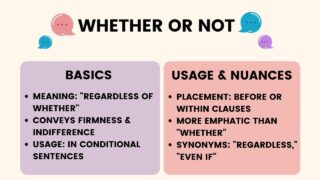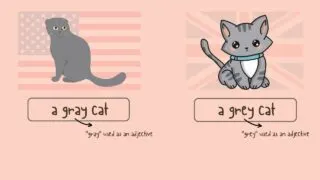Life is full of times when you need to compare one thing to another. Doing that clearly and concisely is easy when you use a word that is intended to do exactly that. Using the word “whereas” makes your comparison easy to understand. The word is versatile, too, because it can also refer to a …
Search results for: whereas
Some words are more common than others. Others just sound cool. No matter whether a word is as typical as “and” or as unusual as schadenfreude, however, one thing that doesn’t change is commas. That’s because, contrary to popular belief, what determines the rules for comma usage is not the word itself but the part …
How does “whether or not” work in the real world? How about its grammar? Do you know how to use it correctly and what other synonyms you can use out there? If you answered “no” to all the questions above, we made this article just for you. Let’s dig right in, whether you’re ready or …
When you think of Brazil, what comes to mind? Its world-famous carnival, the stunning Amazon rainforest, or perhaps its thrilling soccer matches? Yet, have you ever wondered about the language spoken in this vast and diverse nation? What language do they speak in Brazil? Portuguese is Brazil’s official language, due to historical ties to …
Have you ever dreamed of being in Switzerland, breathing in the crisp alpine air and gazing at the picturesque landscapes? One of the most fascinating parts about this dream could be the whirlwind of languages swirling around you. That’s right, Switzerland has more than one official language. Curious? Let’s dive in and discover the unique …
Have spelling differences such as “gray” vs “grey” crossed your mind and made your day even more annoying than it already is? Well, hang in there because you’re not alone. A lot of people are actually going insane over this very issue we’re dealing with today. Why don’t we go about it right now? …
Ever wondered why pesky little marks are sometimes found around letters? And, have you ever wanted to learn how to type them out on your computer? Well, they are not there to annoy you. There is a good number of reasons why these tiny marks exist, such as the one used above the letter “e.” …
Music plays a central part in every global culture. Even the earliest societies found ways to make instruments. In fact, the oldest musical instrument ever found dates back 60,000 years and is known as the Neanderthal Flute! It was discovered in a cave in Slovenia and is made of a bear’s bone. Since then, instruments …
Is there anything more stressful than trying to enjoy time off while worrying about the emails zooming into your inbox? Many of us find ourselves checking our work email constantly, even when we are technically on sick leave or on a hard-earned vacation. One of the best ways to make the most of your time …









